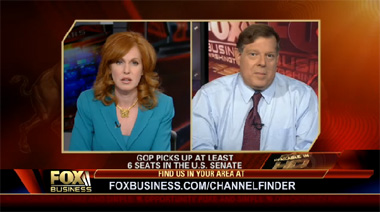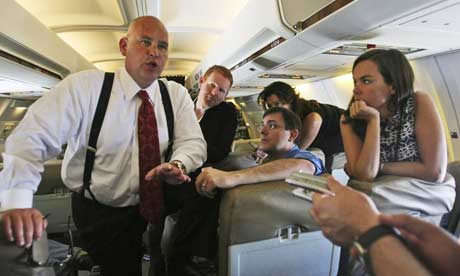Mark Penn, Karen Hughes and Steve Schmidt are our guests this week.
Show produced by Katherine Caperton.
Original Air Date: March 17, 2012 on SiriusXM Satellite Radio “POTUS” Channel 124.
Polioptics airs regularly on POTUS on Saturdays at 6:00 am, 12 noon and 6:00 pm. Follow us on Twitter @Polioptics
Listen to the show by clicking on the bar above. Show also available for download on Apple iTunes by clicking here.
Any of our guests this week — Mark Penn, Karen Hughes or Steve Schmidt — you’d want the chance to sit down with them over a few drinks and ask a litany of questions, over the course of many hours, about the advice they gave as their client as they faced their toughest decisions, whether he or she was the President of the United States or a finalist in the two-year tournament for that office.
- Mark, how do you write and field a poll, and then present the results, that gauge pubic reaction to Bill Clinton’s options during the Constitutional Crisis that threatened his presidency?

Mark Penn does Fox
- Karen, one day you’re helping George W. Bush sell “No Child Left Behind;” the next day you’re counseling a wartime president. What manual do you consult to help you make that pivot?
- Steve, based on your singular experience laid bare on GAME CHANGE, where do you draw the line between doing what it takes to win versus holding back or reversing course, even if it represents surrender?
Unfortunately, Adam Belmar and I had only one hour on this, our 49th episode of Polioptics, to cover the territory with three advisers in the highest-stakes game of American politics. The drinks will have to wait.
* * *
Full disclosure: I’ve worked with Mark Penn going back to 1995, when I was in the White House and he was, along with former partner Dough Schoen and Dick Morris, a shadow team of advisers helping Bill Clinton move to the center after the disastrous 1994 midterm elections. In later years, after leaving government, I worked for Mark and his firm, Penn Schoen Berland.
Working in the White House office of communications in the mid-1990’s, we would get new types of event design assignments in the spring of 1995, which continued through the president’s re-election in 1996 and into his second term in office. These events were specific, but small-bore. Where were they coming from? Drawing ideas from domestic policy advisers, and then testing them with swing voter audiences, Penn, Schoen & Morris were behind them.
Some examples:
- We were ordered to create a picture with the president watching television with parents and their kids, but this TV was equipped with a “V Chip” that helped screen out violent programming.
- We produced a photo of the president walking across the Rose Garden lawn with the head of the Campaign for Tobacco Free Kids and a bunch of schoolchildren to demonstrate unanimity against cigarettes.
- We went to San Diego to plan a presidential speech on a middle school campus where the introduction of school uniforms helped to reduce acts of violence outside the classroom.
- We traveled to Columbus, Ohio to a police training academy to create an event to promote the use of trigger locks on guns. If we weren’t going to reduce the number of handguns in people’s possession, we could at least try to make them safer.
- And back home on the South Lawn of the White House, we welcomed police officers from across the country to support the addition of 100,000 new officers to their departments.
Extolling these modest initiatives, their popularity first measured in opinion research surveys, is part of the reason why Penn was called, in this memorable New York Times Magazine piece by James Bennet, “The Guru of Small Things” (Bennet went on to become editor in Chief of The Atlantic). Penn, as most Polioptics readers will know, went on to advise Hillary Clinton in her 2000 and 2006 U.S. Senate Races and her 2008 presidential bid. He is now CEO of Burson-Marsteller, one the leading global public relations firms. Penn wrote a book called Microtrends: The Small Forces Behind Tomorrow’s Big Changes, which was a New York Times bestseller and is available on Amazon.
* * *

George W. Bush and Karen Hughes
This was a fascinating week to have Schmidt, Hughes and Penn on our program.
First, Mark, Karen and Steve spend most of their time these days advising CEOs and corporate boards on message strategy and crisis management, Penn and Hughes at Burson-Marsteller and Schmidt at Edelman. So when an investment banker named Greg Smith jolted the business world awake on Wednesday morning by detonating his career with an essay, “Why I Am Leaving Goldman Sachs,” placed squarely in the center of the New York Times op-ed page, there are few strategists better equipped to help manage the damage control than the three we had on our show.
Next, the barnstorming of the U.S. by British Prime Minister David Cameron brought the “special relationship” to a new level. Both Mark Penn and Karen Hughes worked closely with former PM Tony Blair, and their insights into how the pairing of Cameron and Barack Obama was playing on both sides of the Atlantic was very much on our minds.
In addition, the emergence of Vice President Biden on the political stump, speaking to a Toledo, Ohio crowd from a podium not with the Vice Presidential Seal but with Obama-Biden 2012 graphics on it, marks a new phase of the campaign. The Democratic ticket is taking off the gloves and calling out their potential GOP rivals by name. It’s something that Mark Penn and Karen Hughes caution against in some of their joint commentary in Time Magazine.
Other Penn/Hughes commentaries for TIME can be found here, here and here.
On a much sadder note, Karen’s thoughts are particularly poignant, given that she served in the Bush Administration as Undersecretary of State for Public Diplomacy, about the damage done to America’s reputation following the alleged massacre by a U.S. soldier of innocent civilians in the Afghan city of Kandahar. Karen continues to speak publicly on the U.S. role in the world and was quick to share her thoughts on this horrific event. We were just talking about these issues two weeks ago when Sebastian Junger was a guest on our broadcast.
Lastly, in the category of innovations in political tactics, the Obama 2012 picks up on where they left off four years ago with the release this week of Davis Guggenheim’s 17-minute documentary THE ROAD WE’VE TRAVELED. Watch it below.
[youtube]2POembdArVo[/youtube]
Guggenheim, you’ll note, is the director of AN INCONVENIENT TRUTH and WAITING FOR SUPERMAN. His expert use of graphics, which was so persuasive in SUPERMAN, is on display in this video as well. And then there’s the emotional power of Tom Hank’s narration, the abundant use of Pete Souza’s still photography and the swelling musical score that pulls at the heartstrings. It all amounts to a very effective mix of cinematographic alchemy.
There are also a number of interesting cameos by Elizabeth Warren, Bill Clinton and Rahm Emanuel in Guggenheim’s film that help to bury the hatchet, if reports of old rivalries still exist. Warren, if you believe books like Confidence Men, wasn’t embraced by President Obama’s economic team. Clinton, of course, was the chief surrogate for Obama’s rival in 2008. And Emanuel, now Chicago’s new mayor, was, according to Jodi Kantor’s book, at odds with the President’s wife.
The film a well packaged summary of the last three years that does what it’s intended to do, and more, given the publicity it has received. Any criticism that this film is biased or unbalanced is itself biased and unbalanced. Guggenhiem and Hanks are forthright in their support of President Obama, and if they can contribute their creative talent to his campaign in addition to their fundraising support, why shouldn’t they do that? People who got excited and passionate about Barack Obama in 2007 and 2008 should welcome a reminder about what first motivated them to back their candidate. All campaigns can benefit by a 15 minute film that pumps up the troops at volunteer meetings or canvassing rallies. Why shouldn’t it be Hollywood quality? I liked it.
* * *

Steve Schmidt on the campaign plane
Obviously, Steve Schmidt has been all over print and the airwaves in the past few weeks, his role in the 2008 presidential campaign given new prominence thanks to the debut of HBO’s GAME CHANGE, the film version of the 2010 book by Mark Halperin and John Heilemann. Knowing Halperin and Heilemann personally (we’ve welcomed both Mark and John in prior episodes of Polioptics), and reading a book like Game Change, you presume that the portraits they paint of the players are based on amalgamations of information.
But then seeing Woody Harrelson play Schmidt on the screen and give voice to Scott’s words (as presented in the book and the secondary research by screenwriter Danny Strong), the amalgamations are brought to life. Finally, when you watch Schmidt validate in subsequent interviews that what was shown on film is accurate, you’re essentially seeing the curtain pulled back on Halperin and Heilemann’s widely-scrutinized and closely-guarded anonymous sourcing for their collaboration. Fascinating stuff.
Here’s Harrelson, as Schmidt, and Julianne Moore, as Sarah Palin, in a climactic scene in GAME CHANGE.
[youtube]bKv8hjMMxo8[/youtube]
In time that Adam and I had Steve on our show, we wanted to consider the “prequal” to GAME CHANGE. In one of the movie’s opening scenes, Sen. John McCain calls Steve as he’s walking his dog, somewhere presumably near Sacramento, and asks him to join his campaign full time. Steve winces, his pain visible. Why? Was the campaign already doomed? Had Steve’s work on California Governor Arnold Schwarzenegger’s re-election campaign been that grueling?
We wanted to know what happened to Steve Schmidt before he got that call from McCain, and from where he acquired the substantial intestinal fortitude that allowed him to 1) strongly advocate for a VP pick like Palin in the first place; 2) do everything he could to try handle Palin when she started going rogue; and 3) be man enough to look McCain in the eye many weeks later, the election all but lost, and admit his mistake.



Leave a Reply